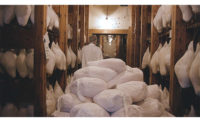Some companies try to focus exclusively on wholesale sales or online sales. Others offer their products through their own meat market. Edwards Virginia Smokehouse has always maintained a presence in all three areas – wherever consumers want to buy their award-winning ham, bacon or sausage. Third-generation owner and curemaster Sam Edwards III jokes that he likes spinning plates, but the company has found many benefits to being so flexible.
That kind of versatility has helped the company navigate the difficulties that have come from the COVID-19 pandemic and the resulting quarantine measures that have been enacted.
“Certainly this pandemic has driven people to online purchases in a big way,” he says. “Where our restaurant trade has dropped off to very low numbers, the online business has picked up the slack.”
The company’s two retail stores in Surry and Williamsburg, Va., closed for two weeks in order to regroup and develop methods of minimizing person-to-person contact. They are open now, and consumers can order online, drive to the store and find their groceries waiting for them on picnic tables.
Edwards Smokehouse has been working with its retail customers to provide products to meet the times. It’s not always easy for them to adapt, though.
“The large grocery stores we sell to, especially the ones that have delis, have chosen to only sell pre-sliced meat, even if they’re slicing ham, wrapping it and putting it on shelves themselves in the meat case,” Edwards says. “We have presented them with the option of pre-cooked, sliced ready-to-eat Surryano or cooked Virginia ham, but their vetting process on new products is so bureaucratic, they can’t move fast enough to make this adjustment. To me, they’re losing sales, and they have empty shelves because it takes too long.
“But the small, independent stores” he continues, “especially the 1-to-15 [location] stores, they say, ‘Great idea, ship it to me.’ They put it out there, and it just evaporates off the shelves.”
Edwards Smokehouse offers a variety of ham products, as well as sausages and bacon. The company’s catalog of hams includes an award-winning “Surryano” ham, which is the company’s domestic equivalent of a Spanish Serrano ham. It also offers country ham in various sizes. Prior to the pandemic, the company’s most popular product was a Petite Country Ham, which is 2 to 3 pounds in size, as well as 1-pound slices of cooked ham.
“All of a sudden, with the pandemic, there are more sales of the raw country hams and whole country hams,” Edwards says, noting the consumer panic in the early days of the shelter-in-place orders. He said that consumers wanted items that had long shelf lives, and there is nothing in the meat world that has a longer shelf life than a country ham.
“These products were developed before there was refrigeration, so it makes sense to go that route versus a pumped product if you’re concerned about space in a refrigerator. You’ve got something that can last a long, long time,” he adds.
For the last four years or so, Edwards has been working with co-packers to produce its products. The company’s processing facility in Surry was destroyed in a 2016 fire, and its first co-packer, Harper’s, suffered the same fate the following year.
‘We had not had any significant fires in the country ham industry in my lifetime, and here we had two fires with 100% destruction in a year,” Edwards comments.
Edwards hopes that the company will be able to rebuild its facility following the results of litigation with its insurance company. For now, he says he is grateful for the help he has received from his co-packers.
“For my competition to offer to step up and offer to help in this process is still remarkable. I’m thankful they were willing and able to help us,” he says.







